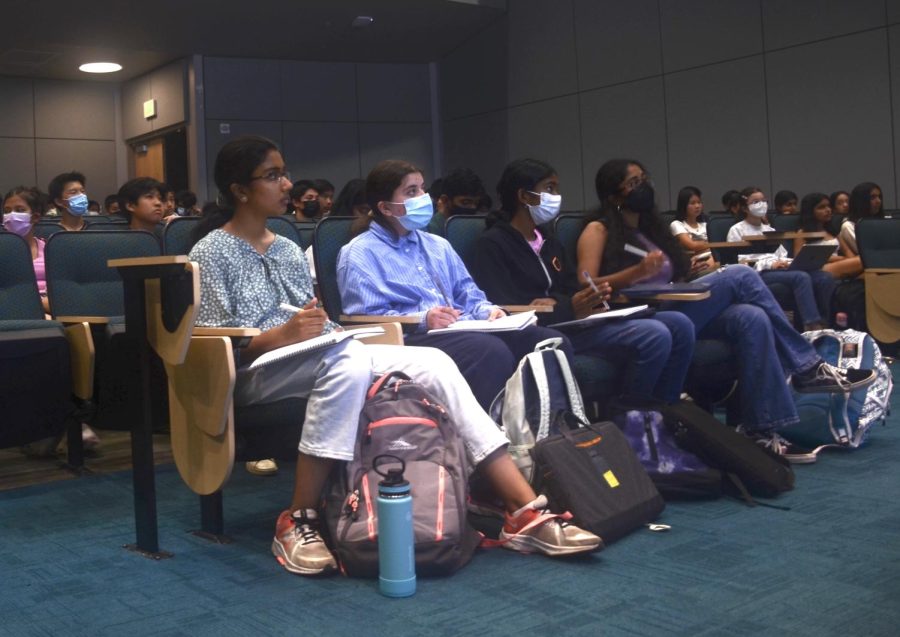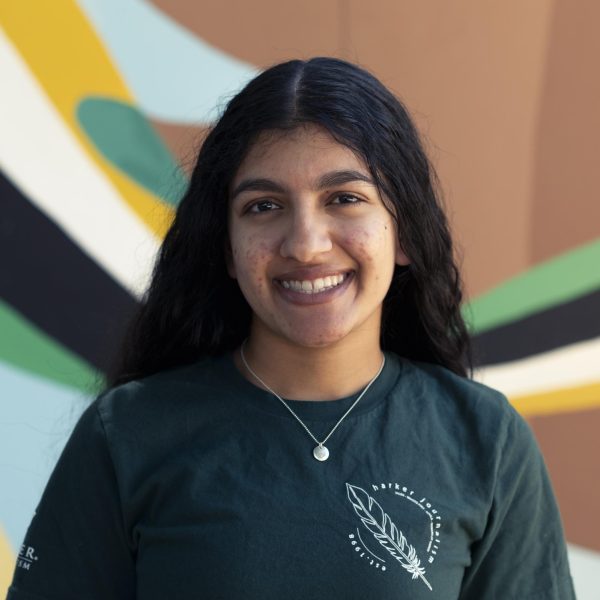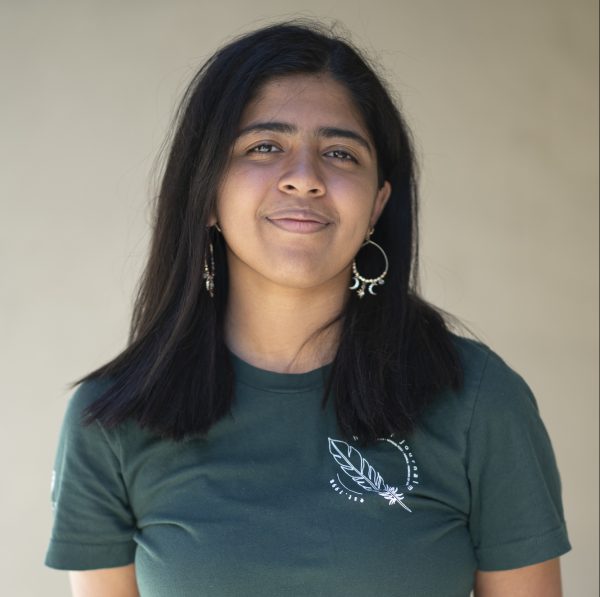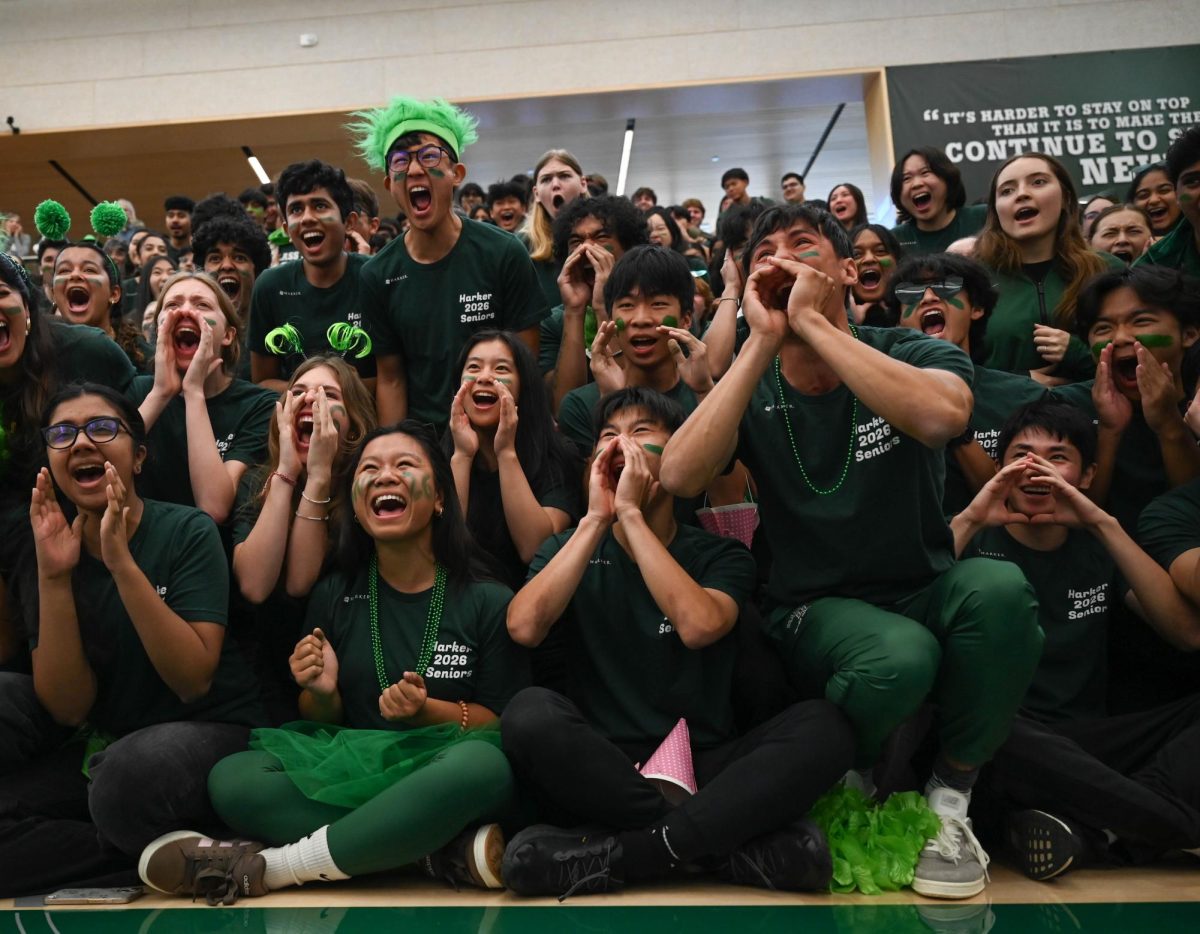Upper school science department holds annual Synopsys and Regeneron informational meeting
Students listen as Mrs. Chetty walks through the Synopsys guidelines. The informational meeting for the Synopsys fair and Regeneron Science Talent Search research competitions took place on Friday in the Nichols Auditorium.
September 6, 2022
Upper school science department head Anita Chetty and research teacher Chris Spenner held the Synopsys and Regeneron informational meeting for students in the Nichols Auditorium on Friday at 3:10 p.m.
The meeting covered important dates and deadlines, guidelines for submitting proposals and mentorships for the Synopsys science fair. Chetty began by addressing non-RRI [regulated research institution] projects, which are done by students either at home or at school where they have access to resources and a lab. She then talked to students doing RRI projects, which are completed with an outside lab or organization.
Synopsys is a competition where students conduct their independent STEM-based research and work to answer questions based on their analysis. The Regeneron Science Talent Search follows a similar structure but is strictly RRI and limited to upper school seniors. While there is no set date for Synopsys yet, it will take place sometime in March; it is also not decided whether Synopsys will be in-person or not. However, students are still required to follow regular procedures in order to complete their projects.
Chetty also introduced Open Lab as a way for students to carry out their research at school. Harker provides all students with the ability to use the given facilities that reside at the school.
“If you’re thinking, I want to do a project at Harker… then that means that you’re going to need to do what we call Open Lab,” Chetty said. “Open Lab is a great opportunity that we’ve set up for you. You’re going to be able to work in the research lab after school as an extracurricular activity under the supervision of a teacher, who is not directly engaged in your project.”
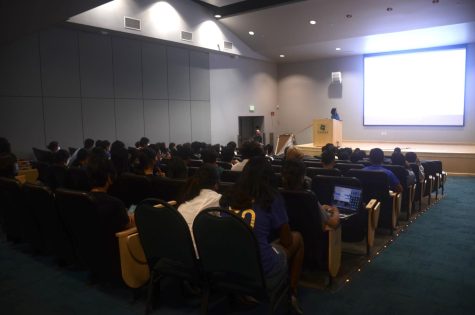
Pavitra Kasthuri (9) previously participated in Synopsys in middle school, where she and a friend created Orbis, an artificial intelligence device used to detect patient monitors and other medical devices. Pavitra looks forward to exploring new topics this year and using her previous experience in Synopsys to have the best outcome.
“I think that Synopsys, or my take-aways for it, tie into my takeaways for highschool,” Pavitra said. “Time-management, organization, responsibility — I think that because I get so much freedom with Synopsys, it’s really important to have personal accountability, and of course integrity, and also making sure that my writing, my project, my data is all consistent.”
The upper school has been participating in Synopsys and Regenron for as long as Spenner has taught at the upper school, which is 16 years. At the beginning, fewer students participated in the competitions, but now, an average of 50 to 70 students participate each year.
“[Synopsys has happened for] as long as I’ve been here,” Spenner said. “I moved to teaching the research classes and helping and actually running Synopsys completely 12 years ago, and then I kind of backed away from it, and Ms. Chetty has been doing more.”
Spenner hopes that students see these science research competitions as a chance to explore different fields of sciences, as opposed to students doing it solely for recognition of achievements or awards.
“Do it for the right reasons,” Spenner said. “I mean, no real scientist goes into science because they want a Nobel Prize. They do it because they care about the work they’re doing. So do it because you’re doing a project that you care about.”


















![“[Building nerf blasters] became this outlet of creativity for me that hasn't been matched by anything else. The process [of] making a build complete to your desire is such a painstakingly difficult process, but I've had to learn from [the skills needed from] soldering to proper painting. There's so many different options for everything, if you think about it, it exists. The best part is [that] if it doesn't exist, you can build it yourself," Ishaan Parate said.](https://harkeraquila.com/wp-content/uploads/2022/08/DSC_8149-900x604.jpg)




![“When I came into high school, I was ready to be a follower. But DECA was a game changer for me. It helped me overcome my fear of public speaking, and it's played such a major role in who I've become today. To be able to successfully lead a chapter of 150 students, an officer team and be one of the upperclassmen I once really admired is something I'm [really] proud of,” Anvitha Tummala ('21) said.](https://harkeraquila.com/wp-content/uploads/2021/07/Screen-Shot-2021-07-25-at-9.50.05-AM-900x594.png)







![“I think getting up in the morning and having a sense of purpose [is exciting]. I think without a certain amount of drive, life is kind of obsolete and mundane, and I think having that every single day is what makes each day unique and kind of makes life exciting,” Neymika Jain (12) said.](https://harkeraquila.com/wp-content/uploads/2017/06/Screen-Shot-2017-06-03-at-4.54.16-PM.png)








![“My slogan is ‘slow feet, don’t eat, and I’m hungry.’ You need to run fast to get where you are–you aren't going to get those championships if you aren't fast,” Angel Cervantes (12) said. “I want to do well in school on my tests and in track and win championships for my team. I live by that, [and] I can do that anywhere: in the classroom or on the field.”](https://harkeraquila.com/wp-content/uploads/2018/06/DSC5146-900x601.jpg)
![“[Volleyball has] taught me how to fall correctly, and another thing it taught is that you don’t have to be the best at something to be good at it. If you just hit the ball in a smart way, then it still scores points and you’re good at it. You could be a background player and still make a much bigger impact on the team than you would think,” Anya Gert (’20) said.](https://harkeraquila.com/wp-content/uploads/2020/06/AnnaGert_JinTuan_HoHPhotoEdited-600x900.jpeg)

![“I'm not nearly there yet, but [my confidence has] definitely been getting better since I was pretty shy and timid coming into Harker my freshman year. I know that there's a lot of people that are really confident in what they do, and I really admire them. Everyone's so driven and that has really pushed me to kind of try to find my own place in high school and be more confident,” Alyssa Huang (’20) said.](https://harkeraquila.com/wp-content/uploads/2020/06/AlyssaHuang_EmilyChen_HoHPhoto-900x749.jpeg)



